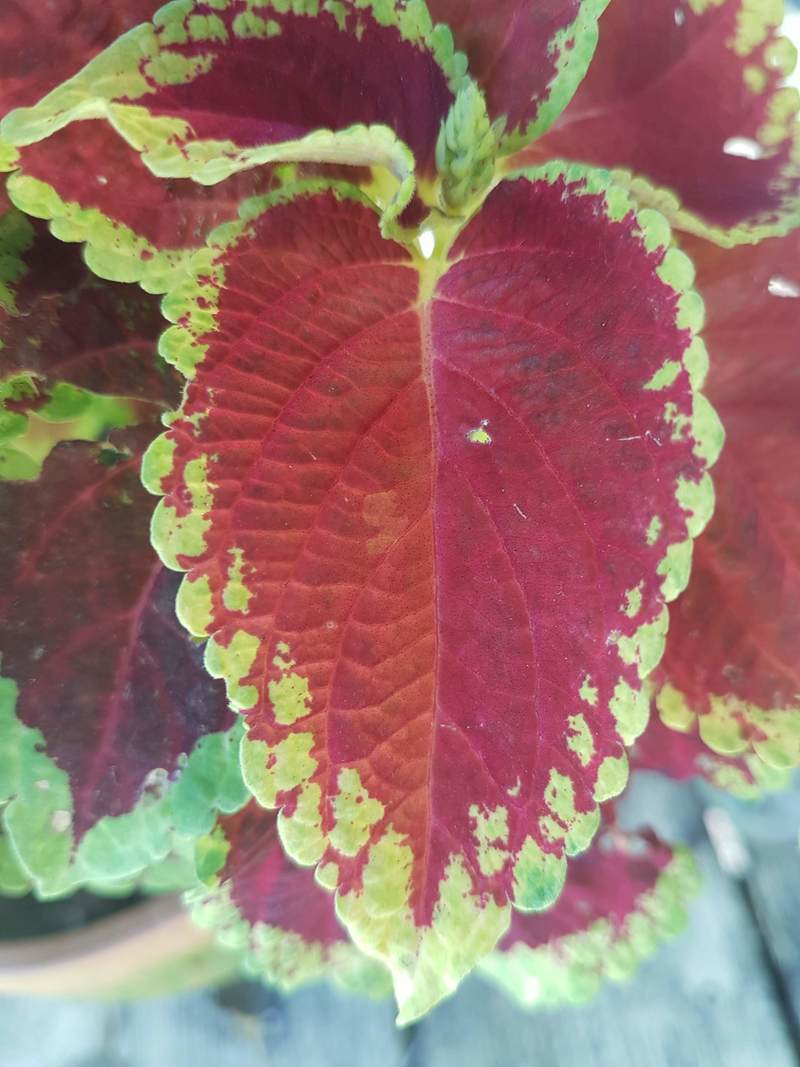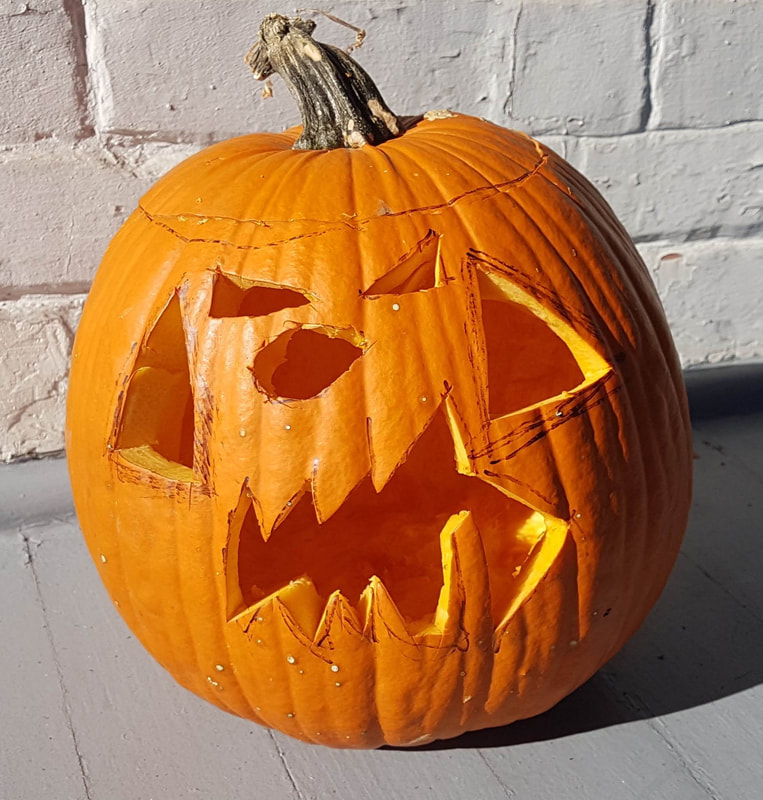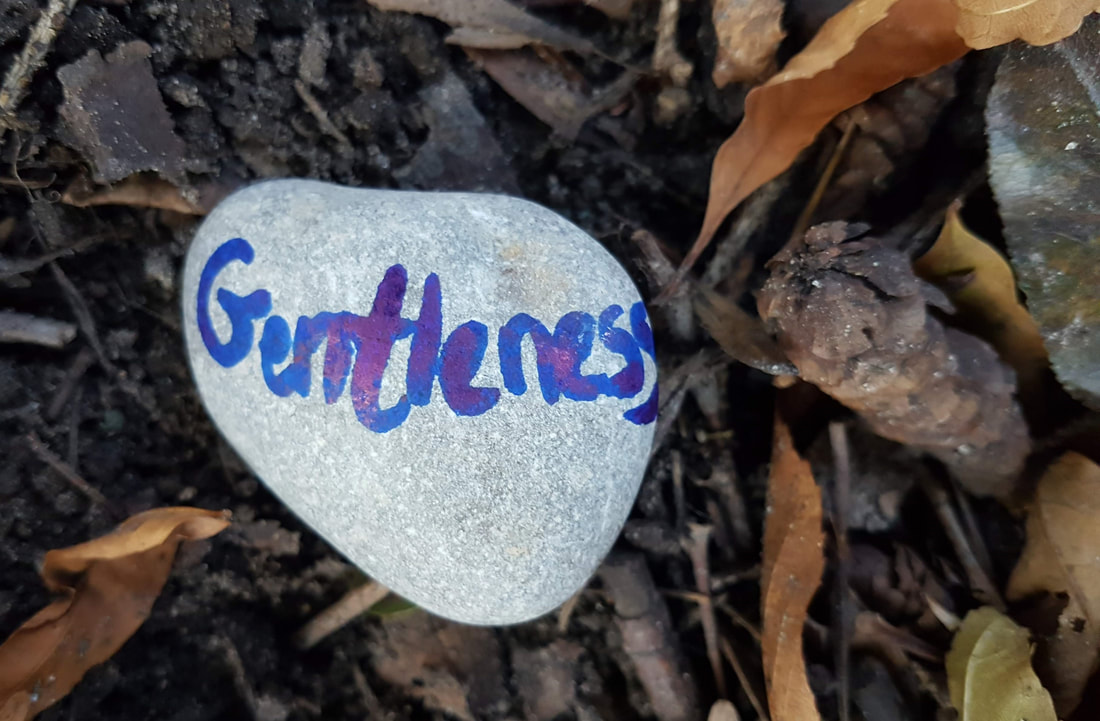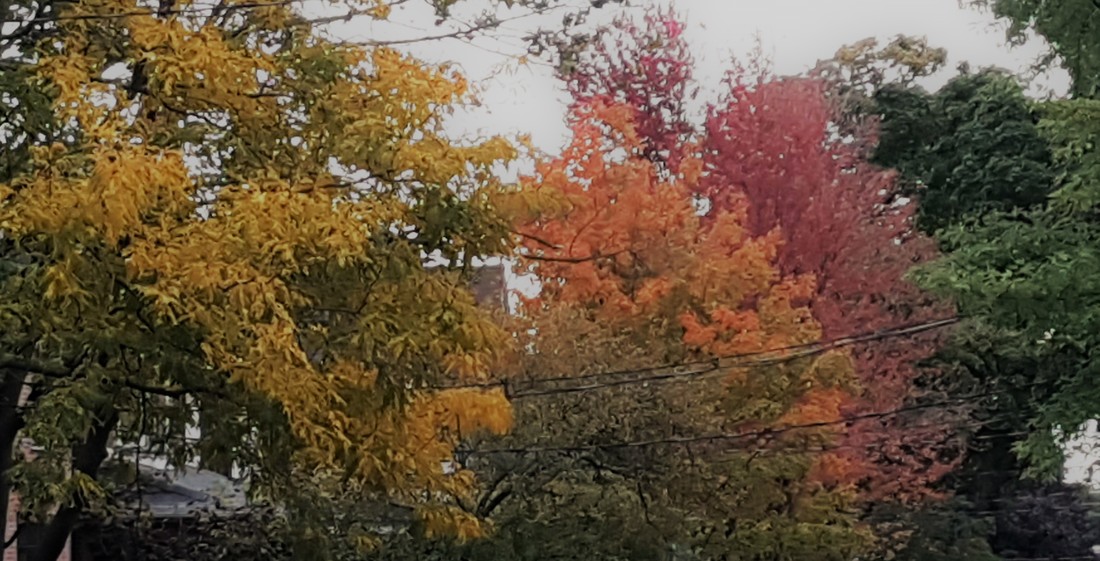|
Although I didn't grow up celebrating Halloween, I am loving some of the decorations I am seeing this year. There are friendly ghosts, giant spiders and webs, pumpkins with all kinds of faces. And yet, some of them are pretty scary! I am glad I'm not a kid - because I think I'd have nightmares!
Perhaps you read my first blog post - which was about why and how to feel feelings. Perhaps your response - whether conscious or not - is - But feeling feelings is too scary! What if I feel too much?! What if it hurts? Many of us fear our feelings, and for good reason. As such, I wanted to follow up with some explanation of why feeling feelings can be so hard - and, accordingly, why it can be so helpful to bring an attitude of self-compassion, curiosity, and patience with ourselves if we are learning to make more space for our feelings. So, here goes. Some reasons why feeling feelings can be so hard, in no particular order. 1. Biology. Some of us experience our feelings more deeply than others. Elaine Aron, PhD, has done important research on "highly sensitive people." In short, these are people (myself included) who feel our feelings more profoundly - whose feelings - both emotions and physical, as well as sensory experiences - are just more intense. When highly sensitive people have "good enough" caregivers as kids, and have developed the capacity to feel their feelings, they can make space for big emotions - which actually offers them special gifts and ways of contributing to society through their sensitivity. However, if, as is often the case, they were responded to when young with - "You are Too Sensitive" - they become ashamed or afraid of their big feels. Feelings become threatening - so much more so given how intense they can be! Making space for big feelings when you are a super-feeler who has been invalidated is definitely possible - but hopefully you can see how it could feel very intimidated. For more on the subject of biology as it relates to feeling, please see this excellent blog post by clinical psychologist Sarah Thompson. 2. Development. As I've alluded to above, our early development and responses we received from our primary caregivers strongly impact our relationship with our feelings. If we were ignored, dismissed, invalidated, or even penalized for expressing emotion, we begin to associate our healthy emotions with fear and/or shame. And who wants to feel fear or shame?! So, we learn to avoid even the healthiest of our feelings because of this pairing. Implicit family rules - which are often cross-generational - also play into things. If there was an unnamed rule of - "We don't express emotions in this family" - we learn that feelings are not ok, that they have no place. As kids, we may have learned to minimize, downplay, or ignore our feelings in order to fit in, to belong. 3. Society and Culture. Western society is pretty driven by productivity, I think. If we perform, produce, make a living, we are valuable. We tend to put more value on rationality and evidence then intuition and inner experience. We may get the societal message that our inner experience doesn't matter - all that matters is how much money we make or how many degrees we have or other external markers. I've also been thinking a lot lately about masculinity and I think things may be uniquely hard for men in terms of developing a capacity to connect to feelings. Men seem to grow up learning that "boys don't cry" and that feeling feelings or prioritizing relationships is [insert insult here]. This is obviously ridiculous - men can have rich inner worlds just like any other human being. But, in receiving these messages - whether implicit or explicit - men have nowhere to put their feelings, no outlet, no permission to feel or express. And so, the quest of feeling feelings may be unfamiliar at best; at worst, feeling feelings can be linked to the shame and fear of being (societally) ridiculed for being human. Many cultures and subcultures also have their own rules and stigmas against feeling and expressing feelings. I've actually done some work around stigma in the Jewish community around feelings and mental health. In response to hard feelings - and experiences of anxiety and depression - there can be messaging that can sound like - "Be Strong and not Weak, survive, be resilient, succeed, rely [only] on your intellect." I understand this messaging as coming from historical trauma, the need to survive, and an understandable difficulty and avoidance of processing the pain of Jewish history and experience. Many other cultures and ethnicities have overlapping, though distinct, implicit messaging around feelings. These cultural norms can make it very challenging to experience and express more painful emotions - even those that are extremely healthy. 4. Existential reality and trauma. Life is in some ways tragic; though it can include much joy and beauty, it is also full of pain and suffering. As I write this, I am inevitably deeply influenced by recent violence against the Jewish community in Pittsburg. I feel a good deal of grief and anger, a little fear - and I also find myself disconnecting from my feelings at times. Perhaps because they are so big - they feel "too much." That is in part because the violence is unbearable - unfathomable - indigestible. And so, my disconnection is perhaps healthy, a way to cope, a way to sometimes disconnect from the grief and the anger so as to go about my day. So it goes with any kind of pain or trauma. We disconnect as a defense against actually experiencing the internal impact of what has occured. This can keep us going, help us cope and even survive, but has costs when it becomes habitual - when we disconnect from our feelings too frequently. When we become too used to disconnecting from our inner experience, we do so in times of joy as well as in times of pain. We become anxious and depressed. We lose the healing power of emotions like sadness and grief, which help us mourn and ultimately let go of the loss, and anger, which helps us hold others accountable and set boundaries. But, still, it makes total sense that we wouldn't want to feel the impact of extremely painful realities - and certainly not all the time. I know this was a lot, and just a taste of really big and important topics. Hopefully, though, it gives you a sense of why it can be so challenging to simply "feel our feelings" - and how many forces we may have inside, for good reasons, to distract, stay only in our heads, and even shame, judge, or scare ourselves for feeling. We also may at times need to be able to disconnect from our inner experience so that we can be present and effective in our lives. So, my point is, if you fear your feelings and/or have trouble feeling and making space for them - see if you can be gentle with yourself! This is hard work. It is in many ways a life-long journey. May we all move closer to a reality in which we can greet our internal experience - even if it is Fear of Feelings - with kindness and compassion. (Perhaps more on this later).
1 Comment
 Fall can be a time of freshness. Of increased vitality. Something new in the air. Leaves are transforming from green to vibrant flashes of yellows and reds and oranges. What better time for me to be writing my first blogpost ever (Exciting! Scary!) and introducing you to the benefits of working with feelings. Right now, as far as therapies go, behaviourally and cognitively oriented therapies are in vogue. That's great - because sometimes we do need to modify our behaviours or cognitions when they are not supporting us. Still - there is really nothing like working directly with our emotions. Our emotions speak to our inner selves, the core of who we are. To what we truly want and need. And guess what?! There really are evidence-based and transformative ways to work with them - to allow them to be, just as they are, to understand what they are trying to tell us, and to transform them in several different ways, which I will introduce below. As far as arriving at our emotions - Les Greenberg, who developed Emotion-Focused Therapy, says: We cannot Leave a Place we have not first Arrived at. Painful emotions are the absolute worst. No one wants to feel them. I often don't want to feel mine. Yet what happens is that when we avoid feeling them - they become worse. They take on a life of their own. They terrify us, control us in ways that we may not even understand. They make us anxious and depressed. We lose the capacity to feel Positive, life-giving feelings - since if we are afraid of feelings, we avoid even the good ones. So Step 1 is to actually Feel our Feelings - even the hard ones! A great way to learn to do this is through Focusing. Focusing is a practice created by psychologist Eugene Gendlin. It is different than mindfulness - which is also super in vogue - in that rather than simply re-focusing on our breath, or noting and then moving away from our feelings, we go into feelings. We do this by first noticing the way we experience the feeling in our bodies. This is so radical in our society, where we tend to be a bunch of talking heads and essentially forget for most of the hours of the day that we even have a body. It can therefore be challenging - and it can take time to develop this muscle. Once we can go inside, and see what we are experiencing in our bodies, we can then give the experience a name, a description. Maybe we are feeling a surge in our chest. Maybe there is a tight ball there. Maybe a sinking feeling. Maybe a warmth or a tingling. Whatever is there - invite it to be, get curious about it, describe it - rather than pushing it away or intellectualizing! For me, as I write this blogpost, there is a surge of something in my chest. I know it is some mixture of excitement and anxiety - but in focusing, I try to stay close to what I am actually experiencing inside and name the sensations as I am experiencing them rather than analyzing or rushing to label it with traditional emotion words. As I notice this feeling of "surging", it changes. For me in this moment, it loses its intensity when I focus in on it. Perhaps I will go more into the practice of focusing in a future post. For now, feel free to experiment with focusing via the following instructions: www.focusing.org/sixsteps.html Step 2: So once we can actually feel our feelings in our bodies, then what? Do we actually want to stay there, in the muck of bad feelings? Of course not! For one, the irony, the paradox, is that when we actually allow our feelings to be as they are, they run their course. They change. They come, and then they go. I promise. They really do. They might come back, but if we keep allowing them to run their course, they will fall just as they rise. Furthermore, in the presence of a caring other - such as in therapy - our feelings can be transformed. For example, if I am feeling hopelessly depressed - and all alone, and I express this to a caring other - and I receive a caring response, I might begin to feel a sense of Connection in addition to my feelings of Despair. This can be transformative! From now on, my feelings of despair have some link to my feelings of connection. I learn that I can be in Despair and feel Connected. The despair loses its power, its terror. It becomes bearable. It transforms into something different - maybe it turns into sadness, or a sense of longing. Speaking of despair, I know that some of you are feeling kind of hopeless or sad about the end of summer. I get that. I love summer as much as the next Torontonian. I challenge you to see if you can allow both the feelings of sadness at the loss of Summer and the excitement and vivacity of fall. See if you can allow this mixture - and see what it makes! Red plus Yellow makes Orange. Play with what comes for you when you mix emotions! Perhaps Sadness and Excitement together makes a whimsical hopefulness - an openness or curiosity to what comes - both inside and out. Happy Fall Colors ya'll. Would love to hear your thoughts, whether or not this resonates or is helpful, and any suggestions for future posts.
|
Proudly powered by Weebly



 RSS Feed
RSS Feed